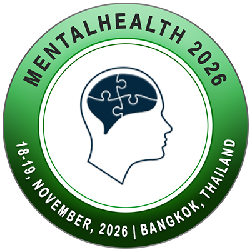Track: Child and Adolescent Psychiatry
1.png)
“Advancing Child and Adolescent Psychiatry: Diagnosis, Treatment, and Support for Mental Health Challenges”
This session will focus on child and adolescent psychiatry, exploring the unique mental health challenges faced by younger populations. Attendees will learn about common psychiatric disorders in children and adolescents, such as attention-deficit/hyperactivity disorder (ADHD), autism spectrum disorders, and anxiety disorders. The session will cover developmental considerations, diagnostic criteria, and effective treatment approaches for this age group. Participants will gain insights into the role of psychotherapy, medication, and family involvement in managing psychiatric conditions in children and adolescents. Emphasis will be placed on early intervention, developmental milestones, and the importance of a supportive environment in promoting mental health.
Developmental Disorders in Children and Adolescents
This session will explore various developmental disorders, including Autism Spectrum Disorder (ASD), Attention-Deficit/Hyperactivity Disorder (ADHD), and learning disabilities. Participants will learn about the diagnostic criteria, symptomatology, and evidence-based interventions for these disorders. The session will also address the importance of early diagnosis and the role of multidisciplinary teams in providing comprehensive care.
Anxiety and Mood Disorders in Youth
This session will focus on anxiety and mood disorders commonly observed in children and adolescents, such as Generalized Anxiety Disorder (GAD), Social Anxiety Disorder, and Major Depressive Disorder. Attendees will discuss the signs and symptoms, risk factors, and effective treatment approaches, including cognitive-behavioral therapy (CBT) and pharmacological options.
The Impact of Trauma and Adverse Childhood Experiences (ACEs)
This session will examine the effects of trauma and adverse childhood experiences on mental health and development. Participants will explore how exposure to trauma, such as abuse, neglect, and household dysfunction, can impact emotional regulation, behavior, and overall well-being. The session will also discuss trauma-informed care approaches and interventions.
Eating Disorders in Children and Adolescents
This session will address the presentation, diagnosis, and treatment of eating disorders in younger populations, including Anorexia Nervosa, Bulimia Nervosa, and Binge Eating Disorder. Attendees will learn about the unique challenges of treating eating disorders in children and adolescents, and the importance of early intervention and family-based treatment approaches.
Behavioral Issues and Conduct Disorders
This session will focus on behavioral issues and conduct disorders in children and adolescents, such as Oppositional Defiant Disorder (ODD) and Conduct Disorder (CD). Participants will discuss the characteristics, risk factors, and evidence-based treatments for these disorders, including behavioral interventions and parent training programs.
Psychopharmacology in Pediatric Psychiatry
This session will provide an overview of psychopharmacological treatments used in child and adolescent psychiatry. Attendees will learn about the indications, efficacy, and potential side effects of various medications used to treat conditions such as ADHD, depression, and anxiety. The session will also emphasize the importance of careful medication management and monitoring in younger patients.
Adolescent Substance Use and Addiction
This session will explore the prevalence, risk factors, and treatment approaches for substance use and addiction in adolescents. Participants will discuss the impact of substance use on adolescent development, effective screening tools, and evidence-based interventions, including motivational interviewing and family therapy.
The Role of Family and Environmental Factors in Pediatric Mental Health
This session will examine how family dynamics and environmental factors influence the mental health of children and adolescents. Attendees will explore the impact of parenting styles, family conflict, socioeconomic status, and community resources on mental health outcomes. The session will also discuss strategies for involving families in treatment and promoting a supportive environment for youth.
Scientific Highlights
- Mental Health
- Women’s Mental Health
- Psychology and Psychiatry
- Autism
- Stress, Anxiety and Depression
- Psychotherapy and Counseling Psychology
- Behavioral Health and Bullying
- Suicide and Self Harm
- Bipolar Disorder
- Schizophrenia
- Neurology and Neurological Disorder
- Addiction
- Obesity and Eating Disorder
- Child and Adolescent Psychiatry
- Obsessive Compulsive disorder
- Post-Traumatic Stress Disorder
- Personality Disorder
- Child Abuse
- Legal and Ethical Issues in Clinical Research


